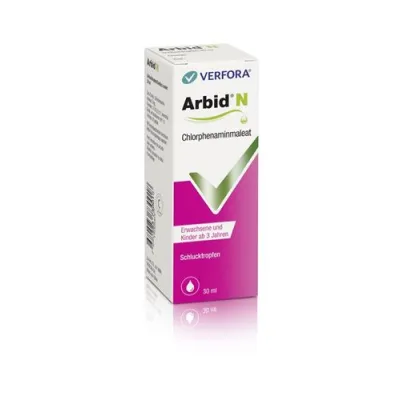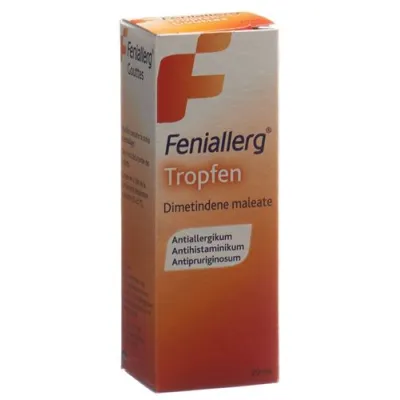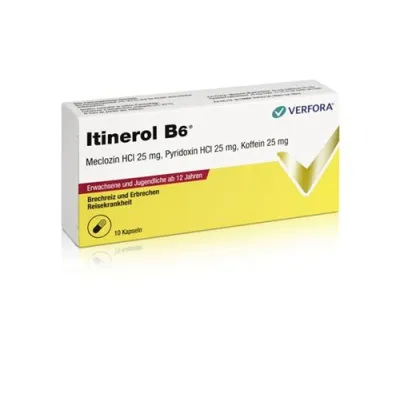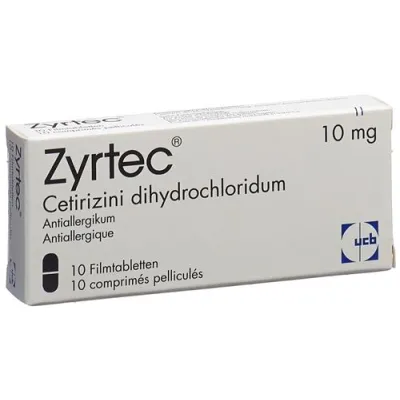Antihistamines
(1 Pages)
Arbid n drops fl 30ml
What is Arbid N, oral drops and when is it used? Arbid N contains an antihistamine, chlorphenamine maleate. It is used in inflammatory and allergic diseases of the upper respiratory tract such as colds, hay fever, chronic runny nose, vasomotor or allergic nasal discomfort, rhinopharyngitis, allergic sinusitis and as an adjuvant in influenza and colds. For the symptomatic Care of allergic conditions such as urticaria (nettle rash), conjunctivitis (conjunctivitis). When should Arbid N, drops to be used not be used? If you are sensitive to any component of the drug, at risk of narrow-angle glaucoma (increased pressure in the eye) or have difficulty urinating, or during concomitant Care and for up to 2 weeks after stopping Care with certain drugs for depression (especially MAO-He always). In addition, Arbid N must not be used during the last trimester of pregnancy or while breastfeeding (see «Can Arbid N be taken during pregnancy and while breastfeeding?»).Arbid N must not be used in children under the age of 3 years.When should caution be taken when taking/using Arbid N, oral drops?Arbid N must not be used for a long time or in higher than recommended doses without medical advice.Stepping Allergic reactions to or narrowing of the bronchi with breathing difficulties, so-called bronchospasm (see under «What side effects can Arbid N have?»), the Care must be stopped immediately and the doctor informed.This medicine can impair the ability to react, the ability to drive and the ability to use tools or machines.Arbid N contains sucrose. Therefore, if you know that you have an intolerance to certain sugars, please consult your doctor before taking Arbid N before taking Arbid N.Arbid N contains sodium methyl parahydroxybenzoate (E219) and sodium propyl parahydroxybenzoate (E217), which may cause allergic reactions (possibly delayed).This Care product contains less than 1 mmol sodium (23 mg) per gram (20 drops), i.e. it is almost «sodium-free». Inform your doctor, Ref: or Ref: or your doctor, Ref: or Ref: if you suffer from other illnesses, have allergies or are taking other medicines (including those you bought yourself!) or using them externally.May Arbid N, swallow drops be taken/used during pregnancy or while breastfeeding?If you foresee becoming pregnant, if you If you are pregnant or breastfeeding, you should avoid taking medicines. It is known that taking Arbid N during the last trimester can adversely affect the health of the fetus. For this reason, Arbid N must not be taken during the last trimester. Arbid N can be taken during the first and second trimester if there is a strong indication and if the doctor prescribes it.Arbid N must not be taken during breast-feeding. However, if you absolutely have to take Arbid N when prescribed by a doctor, you must refrain from breastfeeding.How do you use Arbid N, drops to swallow?Unless otherwise prescribed by the doctor, the usual dosage for children aged 3-5 years is: 10 drops 4-6 times a day; for children aged 6-12 years: 20 drops 4-6 times a day, for adults: 40 drops 4-6 times a day. Preferably take between meals. Observe the dosage given in the package leaflet or described by your doctor. WhomIf you think the medicine is too weak or too strong, talk to your doctor, Ref: or druggist.What side effects can Arbid N, swallow drops have?The following side effects can occur when taking Arbid N:Sensitive people can have allergic reactions (rash, itching, increased heart rate, breathing disorders, loss of consciousness). In this case, you should stop taking the medicine and talk to your doctor as soon as possible.If you take an overdose of the active ingredient chlorphenamine, you may experience cramps, difficulty breathing, even acute shortness of breath and coma. Children, especially small children, react with particular sensitivity if the dosage is too high.Common (affects 1 to 10 users in 100)Drowsiness and reduced responsiveness (see «When should caution be taken when taking/using Arbid N, drops to swallow?»).Uncommon (affects 1 to 10 users in 1000)Stomach and intestinal disorders such as constipation; dry mouth; trouble urinating; visual disturbances (accommodation disorders); increase in intraocular pressure; restlessness (especially in children); Nervousness; Sleep disturbances.OccasionallySkin rash and bone marrow depression.If you nevertheless observe side effects, inform your doctor, Ref: or druggist. This also applies in particular to side effects that are not listed in this leaflet.What else needs to be taken into account?The medicine may only be used up to the date marked «EXP» on the container.Storage instructionsStore Arbid N at room temperature (15-25 °C) in the original packaging out of the reach of children. Close the opened container carefully after taking a dose.Further informationThe Arbid N bottles have a child-resistant closure. To open, the cap must be pressed down and turned at the same time. The childproof lock is only effective if the cap is firmly screwed on as far as it will go after use. Your doctor, Ref: or druggist can provide you with further information. These people have the detailed technical information. What does Arbid N, drops to swallow contain? 1 g (approx. 20 drops) drops to swallow contains: Active ingredients 2 mg chlorphenamine maleate. Excipients Sucrose, citric acid monohydrate, sodium methyl(4-hydroxybenzoate) (E 219), sodium propyl(4-hydroxy benzoate) (E 217), orange aroma, purified water.Authorization number58373 (Ref:).Where can you get Arbid N, drops to swallow? Which packs are available? In pharmacies and drugstores, without a doctor's Ref:, in 30 ml dropper bottles. Authorization holder VERFORA SA, 1752 Villars-sur-Glâne. This leaflet was last checked by the Care products authority (Ref:) in December 2020...
36,08 USD
Feniallerg drops 1 mg/ml bottle 20 ml
Feniallerg blocks the action of histamine, one of the substances released during allergic reactions. Feniallerg relieves itching and skin irritation caused by allergic reactions, reduces edema (abnormal accumulation of fluid in the skin or mucous membranes) and relieves the symptoms of nasal allergic such as runny nose, tearing and sneezing. Feniallerg is used in the following cases: for allergic skin conditions: itching of various origins (except itching associated with jaundice), eczema and other itchy skin diseases, nettle fever, itching associated with diseases with skin rashes such as chickenpox; for insect bites; for allergic diseases of the upper respiratory tract:hay fever and other forms of nasal allergic; for the Care of symptoms caused by food or drug allergies. Ref:-approved patient information Feniallerg GSK Consumer Wellnesscare Schweiz AG What is Feniallerg and when is it used? Feniallerg inhibits the effects of histamine, a of the substances released in allergic reactions. Feniallerg relieves itching and skin irritation caused by allergic reactions, reduces edema (abnormal accumulation of fluid in the skin or mucous membranes) and relieves the symptoms of nasal allergic such as runny nose, tearing and sneezing. Feniallerg is used in the following cases: for allergic skin diseases: itching of various origins (except itching associated with jaundice), eczema and other itchy skin diseases, nettle fever, itching associated with diseases with skin rashes such as chickenpox; for insect bites;for allergic diseases of the upper respiratory tract:hay fever and other forms of nasal allergic;for the Care of symptoms caused by food or drug allergies.When should Feniallerg not be used?You must not use Feniallerg if you are allergic (hypersensitive) to the active substance dimetinden maleate or any of the excipients . Feniallerg should not be used in newborn babies less than 1 month old, especially premature babies. Talk to your doctor or Ref: if the above applies, because then Feniallerg is not suitable for you. When is caution required when using Feniallerg?Inform your doctor or Ref: before taking Feniallerg drops if you glaucoma,urinary retention (e.g. due to an enlarged prostate),epilepsy, suffer from chronic obstructive pulmonary disease or other diseases.Elderly patients should consult their doctor before taking this medicine, as side effects such as agitation and tiredness may occur. If you are taking any of the following medicines, you should only take Feniallerg after consulting your doctor: Medicines for depression (MAOIs or tricyclic antidepressants),Anticholinergics such as bronchodilators (medicines used to treat asthma or bronchospasm), gastrointestinal antispasmodics (medicines used to treat stomach intestinal spasms), mydriatics (medicines to dilate the pupil), urological antispasmodics (medicines to treat the symptoms of urinary incontinence or an overactive bladder),medicines that depress the central nervous system (such as sedatives or sleeping pills), Medicines for epilepsy, Cares (strong Cares),Antihistamines (medicines used for coughs, colds or allergies),Antiemetics (medicines against vomiting),Procarbazine (medicine to treat certain types of ),Scopolamine (medicine to prevent motion sickness),if alcohol is taken at the same time.This medicine can impair your ability to react, the ability to drive and the ability to use tools or machines! Like other antihistamines, Feniallerg can increase the effects of alcohol. In small children from 1 month to 1 year, Feniallerg may only be used on medical recommendation. The recommended dosage must not be exceeded. The depressant effect may be accompanied by pauses in breathing during sleep. Antihistamines can trigger states of excitement, especially in children and elderly patients. This Care product contains propylene glycol 100 mg/ml (or per 20 drops). This Care product contains benzoic acid 1 mg/ml (or per 20 drops). This Care product contains less than 1 mmol (=23 mg) sodium per 1 ml (or per 20 drops), i.e. essentially 'sodium-free'. it is almost «sodium-free». Tell your doctor, Ref: or druggist if you suffer from other diseases,have allergies oruse other medicines (including those you bought yourself!)! Can Feniallerg be used while pregnant or breastfeeding?If you are pregnant, you should not take Feniallerg unless your doctor has told you to. Taking Feniallerg while breastfeeding is not recommended. If you are pregnant or breast-feeding, think you may be pregnant or planning to become pregnant, consult your doctor before taking this medicine. How do you use Feniallerg?Adults and adolescents over 12 yearsRecommended daily dose:drops 1 mg/ml: 20-40 drops, 3 times a day. ChildrenIn small children from 1 month to 1 year, Feniallerg drops may only be used as recommended by a doctor. The recommended daily dose is:2 drops per kg of body weight per day, divided into 3 intakes. Age/WeightDose in drops 1 month - 1 year / 4.5 - 15 kg 3-10 drops, 3 times a day 1-3 years / 15-22.5 kg 10-15 drops, 3 times a day 3-12 Years / 22.5-30kg 15-20 drops, 3 times a day The optimal dose will be determined by your doctor. The Feniallerg drops are sensitive to heat. Therefore, add the drops to the lukewarm baby bottle at the last moment. If the child can already eat with a spoon, give him the pleasant-tasting drops undiluted with a teaspoon. Feniallerg, drops should not be taken for more than 14 days without medical advice. If you have taken too much Feniallerg: Talk to your doctor or Ref: immediately. If you miss a dose: Take Feniallerg as soon as you remember, unless it is less than 2 hours until the scheduled dose. In this case you should not take the missed dose but take the next dose at the usual time according to the dosing schedule. Do not take a double dose to make up for the missed dose. Stick to the dosage given in the package leaflet or as prescribed by your doctor. If you think the medicine is too weak or too strong, talk to your doctor, Ref: or druggist. What side effects can Feniallerg have?Like all medicines, Feniallerg can cause side effects, although not everyone gets them. Stop taking Feniallerg and tell your doctor straight away if you get any of the following symptoms, which may be signs of an allergic reaction: difficulty breathing or swallowing,swelling of the face, lips, tongue or throat,severe itching of the skin with a red rash or blisters, muscle spasms .These side effects are very rare (affects less than 1 in 10,000 people). Other side effects are usually mild and temporary. They occur mainly at the beginning of Care. Very common (affects more than 1 in 10 people)Fatigue Common (affects 1 to 10 users in 100)Drowsiness, nervousnessRare (affects 1 to 10 users in 10,000)Excitement, headache, dizziness, gastrointestinal disorders such as vomiting, dry mouth or throat. If you get any side effects, talk to your doctor, Ref: or druggist. This also applies in particular to side effects that are not listed in this leaflet. What else needs to be considered?Shelf lifeThe Care product may only be used up to the date marked on the container with ‹ EXP› are used. Storage instructionsProtect from light and store at room temperature (15-25°C). Keep out of the reach of children. Further informationYour doctor, Ref: or druggist can provide you with further information. These people have the detailed information for specialists. What does Feniallerg contain?1 ml of Feniallerg oral drops, solution contains Active ingredient1 mg dimetindene maleate. ExcipientsBenzoic acid (E 210), propylene glycol (E 1520), disodium phosphate dodecahydrate (E 339), citric acid monohydrate (E 330), sodium edetate, saccharin Sodium (E 954), purified water. Approval number27528 (Ref:) Where can you get Feniallerg? What packs are available?In pharmacies and drugstores, without a doctor's Ref:. Packs of 20 and 50 ml. Authorization holderGSK Consumer Wellnesscare Schweiz AG, Risch. This leaflet was last checked by the Medicines Agency (Ref:) in June 2021. ..
19,33 USD
Fenistil gel 0.1% 100g
Fenistil Gel inhibits the action of histamine, one of the substances released during allergic reactions. Applied to the skin, it relieves itching of allergic origin. Fenistil Gel also exhibits local anesthetic properties. Fenistil Gel is indicated for itchy skin diseases, e.g. insect bites, minor small-scale burns, minor sunburn that is not extensive, small-scale allergy-related skin diseases. The basis is a watery gel that allows the active ingredient to penetrate the skin well. Itching and other skin irritations are quickly relieved in this way (within a few minutes). The gel is odorless and colorless and does not stain clothing. Ref:-approved patient informationFenistil, Gel GSK Consumer Wellnesscare Schweiz AG What is Fenistil Gel and when is it used? Fenistil Gel inhibits the effect of histamine, one of the substances released during allergic reactions. Applied to the skin, it relieves itching of allergic origin. Fenistil Gel also exhibits local anesthetic properties. Fenistil Gel is indicated for itchy skin diseases, e.g. insect bites, minor small-scale burns, minor sunburn that is not extensive, small-scale allergy-related skin diseases. The basis is a watery gel that allows the active ingredient to penetrate the skin well. Itching and other skin irritations are quickly relieved in this way (within a few minutes). The gel is odorless and colorless and does not stain clothing. When not to use Fenistil Gel?You must not use Fenistil Gel if you are allergic to dimetindene maleate or an excipient. The preparation must not be used if you have a known allergy to insect bites (the doctor's instructions must be followed). Do not apply the preparation to open or inflamed wounds, weeping skin diseases or mucous membranes, especially in infants or small children, and do not use it near the eyes. When is caution required when using Fenistil Gel?Children under the age of 2 years of age may only use the preparation if prescribed by a doctor. A large-scale application, as well as application on open wounds or large-scale skin injuries or damage (such as burns) should be avoided, especially in infants and small children. Avoid prolonged sun exposure of the treated areas. Consult your doctor if it is very itchy or if you have extensive skin lesions. Contact your health care professional if symptoms persist for more than 7 days. Information on the excipientsFenistil Gel contains 150 mg/g propylene glycol (E1520): Propylene glycol can cause localized skin irritation. Fenistil Gel contains 0.05 mg/g benzalkonium chloride: Benzalkonium chloride is an irritant and may cause skin reactions. If you are breastfeeding, you must not apply this medicine to the breast as your baby may ingest it with the milk. Applied to the skin, Fenistil Gel has no or negligible influence on the ability to drive or use machines. Tell your doctor, Ref: or druggist if you suffer from other diseases,have allergies, especially to other medicines ortake other medicines (including those you bought yourself!) or use them externally. Can Fenistil Gel be used during pregnancy or breastfeeding?During pregnancy and breastfeeding, you should use Fenistil Gel with caution and not Apply to large, chafed or inflamed areas of skin. The gel should not be applied to the nipples while breastfeeding. How to use Fenistil Gel?Adults and children over 2 years old:2 to 4 times Apply a thin layer to the affected areas of skin every day and rub in gently. Do not use for more than 7 days without medical advice. In children under the age of 2 years, the preparation may only be used as prescribed by a doctor. Tell your doctor or nurse straight away if you or your child accidentally take this medicine. Follow the dosage given in the package leaflet or as prescribed by your doctor. If you think the medicine is too weak or too strong, talk to your doctor, Ref: or druggist. What side effects can Fenistil Gel have?Uncommon side effects (between 1 and 10 users in 1,000): Dryness or burning of the skin . Very rare side effects (affecting less than 1 in 10,000 people): Allergic skin reactions, including rash and itching. In this case, stop the Care and talk to your doctor, Ref: or druggist. If you get any side effects, talk to your doctor, Ref: or druggist. This also applies in particular to side effects that are not listed in this leaflet. What else needs to be considered?Shelf lifeThe Care product may only be used up to the date marked on the container with « EXP» can be used. Storage instructionsStore at room temperature (15-25°C). Keep out of the reach of children. Further informationYour doctor, Ref: or druggist can provide you with further information. These people have the detailed information for specialists. What does Fenistil Gel contain?Active substance1 g gel contains 1 mg dimetindene maleate. ExcipientsPropylene Glycol (E1520), Sodium Edetate, Sodium Hydroxide, Carbomer, Benzalkonium Chloride, Purified Water. Approval number38762 (Ref:). Where can you get Fenistil Gel? What packs are available?In pharmacies and drugstores, without a doctor's Ref:. Packs of 30 and 100 g. Authorization holderGSK Consumer Wellnesscare Schweiz AG, Risch. This package leaflet was last checked by the medicines authority (Ref:) in December 2020. ..
86,35 USD
Fenistil gel 0.1% 30g
Fenistil Gel 0.1% 30 g If you're looking for fast-acting relief from itching and swelling caused by insect bites, plants, or other skin irritations, look no further than Fenistil Gel 0.1% 30 g. This topical gel is specifically designed to soothe and reduce the discomfort associated with minor skin irritations, providing fast and effective relief when you need it most. Active Ingredients The primary active ingredient in Fenistil Gel is dimethindene maleate, a potent antihistamine that works by blocking histamine receptors and reducing inflammation in the affected area. This results in a rapid reduction in itching, burning, redness, and other uncomfortable symptoms, letting you get back to your day without discomfort or distraction. How it Works To use Fenistil Gel, simply apply a small amount to the affected area and rub it in gently until fully absorbed. The gel is quickly absorbed by the skin, delivering its powerful combination of active ingredients deep into the affected tissue. You'll experience almost immediate relief, with symptoms subsiding within minutes of application. Benefits Fenistil Gel offers a number of benefits to users, including: Powerful antihistamine action for fast-acting relief from itching, swelling, and other skin irritations Non-greasy formula that absorbs quickly without leaving a residue Gentle and safe for use on most skin types, including sensitive skin Long-lasting relief even from the most stubborn skin irritations Conclusion If you're looking for a fast and effective way to soothe minor skin irritations and get back to your day, Fenistil Gel 0.1% 30 g is the perfect solution. With its powerful antihistamine action, gentle and safe formula, and long-lasting relief, it's no wonder that Fenistil Gel is trusted by millions of people worldwide. So why wait? Try Fenistil Gel today and experience the fast-acting relief you need and deserve!..
40,56 USD
Itinerol b6 10 capsules
What is Itinerol B6 and when is it used?Itinerol B6 capsules contain active ingredients that prevent or stop nausea and vomiting. Their effect lasts 12 – 24 hours. Itinerol B6 is used against nausea and vomiting of various origins, namely:motion sickness;Morning sickness (only on medical Ref: and when absolutely necessary);in children: usual vomiting, nervous and acetonemic vomiting (the capsules must not be used in children under 12 years of age).When should Itinerol B6 not be used?If you are hypersensitive to any of the ingredients, especially meclozine or vitamin B6 (pyridoxine).When should caution be exercised when taking Itinerol B6?If you have narrow-angle glaucoma or suffer from prostatic hypertrophy, please inform your doctor before taking Itinerol B6.Meclozine, one of the active ingredients of Itinerol B6, increases the depressive effect of barbiturates, tranquilizers and alcohol. Pyridoxine (vitamin B6) reduces the effect of levodopa (active ingredient in certain drugs for Parkinson's disease).Motorists and machine operators should take into account that the preparation may occasionally cause slight drowsiness and therefore may impair the ability to react, the ability to use tools or machines and the ability to drive.Inform your doctor, Ref: or druggist if you suffer from other illnesses, have allergies or are taking or using other medicines (including those you have bought yourself!).Can Itinerol B6 be taken during pregnancy or while breastfeeding?During pregnancy, Itinerol B6 may only be taken on Ref: and if absolutely necessary.If Care with Itinerol B6 is necessary during breastfeeding, the child must be weaned.How do you use Itinerol B6?Unless otherwise prescribed by your doctor:Vomiting and nausea of various origins, dose per 24 hoursAdults and adolescents aged 12 years and over : 1 – 4 capsules.Motion sickness (1 hour before departure), dose per 24 hoursAdults and adolescents aged 12 years and over: 1 capsule.morning sicknessOnly on Ref:: In the evening and if necessary in the morning: 1 – 2 capsules.Do not exceed 4 capsules per 24 hours.Follow the dosage instructions in the package leaflet or as prescribed by your doctor. If you think the medicine is too weak or too strong, talk to your doctor, Ref: or druggist.What side effects can Itinerol B6 have?The following side effects can occur when taking Itinerol B6: Fatigue cannot be ruled out, but is usually compensated for by the caffeine. Dry mouth, tachycardia, stomach problems and, rarely, blurred vision can also occur. Very rare: urticaria.If you notice any side effects not listed here, please inform your doctor, Ref: or druggist.What else should be considered?Itinerol B6 should be stored at room temperature (15 – 25 °C), in a dry place and out of the reach of children.The medicine must only be used until the date marked "EXP" on the container. Expired medicines should be returned to the Care or drugstore.Your doctor, Ref: or druggist can provide you with further information. These people have the detailed specialist information.What is contained in Itinerol B 6 ?1 capsule contains the active ingredients 25 mg meklozine dihydrochloride, 25 mg pyridoxine hydrochloride (vitamin B6) and 25 mg caffeine. It also contains 105 mg sucrose, the colorants yellow orange (E 110) and indigotine (E 132) and other excipients.registration number40770 (Ref:).Where can you get Itinerol B6? What packs are available?Itinerol B6 is available in the following packages without a Ref: in pharmacies and drugstores:Box of 10 capsules.Itinerol B6 suppositories are also available for adults and adolescents, children aged 6 – 12 years and infants/children aged 3 months – 6 years.marketing authorization holderVERFORA SA, Villars-sur-Glâne...
41,75 USD
Tavegyl 1 mg 20 tablets
What is Tavegyl and when is it used?Tavegyl contains the active ingredient clemastine, an antihistamine that is used to relieve allergy symptoms. Tavegyl inhibits the effect of histamine, a substance that is released during allergic reactions (such as rashes, swelling of tissues, severe itching).Tavegyl relieves the symptoms ofallergic hay fever (watery eyes, sneezing, runny nose),allergic skin reactions (redness, small blisters, itching, swelling),insect bites.If you have any further questions about how Tavegyl works, ask your doctor or Ref:.When should Tavegyl not be used?Tavegyl tablets must not be used:in children under 6 years of age;in case of hypersensitivity to clemastine, other similar antiallergic drugs (antihypersensitivity agents) or to any of the excipients listed in the composition;in patients suffering from porphyria (a metabolic disease).When should caution be exercised when taking Tavegyl?Tiredness may occur after taking Tavegyl. This medicine may impair your ability to react, drive, or use tools or machines! If you notice any of these side effects, do not drive or operate machinery.In the following cases you should only take Tavegyl as prescribed by your doctor:Patients with epilepsy or seizures, glaucoma (i.e. increased pressure in the eye), stomach ulcer, severe stomach diseases, prostate and bladder diseases;elderly patients, as side effects such as agitation and fatigue are more likely to occur in this age group;if you are taking the following medicines: medicines to treat anxiety, sleeping disorders, sedatives, certain Cares or MAO inhibitors (medicines to treat depression); Tavegyl may increase the effect of these medicines.Tavegyl may increase the effects of alcohol. Avoid drinking alcohol if you are taking this medicine.Tavegyl tablets contain lactose: please only take Tavegyl tablets after consulting your doctor if you know that you suffer from sugar intolerance.Inform your doctor, Ref: or druggist if yousuffer from other diseases,have allergies orUse tranquilizers, antidepressants or other medicines (even those bought yourself!)Can Tavegyl be taken during pregnancy or while breastfeeding?If you are planning to become pregnant, are pregnant or breast-feeding, you must not take Tavegyl.Ask your doctor/Ref: before taking any medicine during pregnancy.How do you use Tavegyl?Tavegyl, tablets are taken with some water before meals.Adults and adolescents aged 12 and over:1 tablet in the morning and evening. Unless otherwise prescribed by your doctor, you can take up to 6 tablets daily (within 24 hours); the maximum single dose is 2 tablets.Children aged 6-12:½ to 1 tablet before breakfast and before going to bed.Tavegyl tablets should not be taken for longer than 14 days without medical advice. The recommended dosage must not be exceeded.If you have taken too much Tavegyl, consult your doctor immediately.Follow the dosage instructions in the package leaflet or as prescribed by your doctor. If you think the medicine is too weak or too strong, talk to your doctor, Ref: or druggist.What side effects can Tavegyl have?Very common (affects more than 1 in 10 users)Tavegyl can very often cause tiredness and, particularly in children, also excitement of the central nervous system.Common (affects 1 to 10 users in 100)Drowsiness can often occur.Occasionally (affects 1 to 10 users in 1000)Dry mouth, headache, dizziness, skin reactions, nausea, stomach pain and constipation may occasionally occur.Rare (affects 1 to 10 in 10,000 users)Rarely, rapid heartbeat (tachycardia) may occur.Hypersensitivity reactions (skin rash, shortness of breath, shock) may rarely occur.Stop Care with Tavegyl and tell your doctor immediately if you experience one or more of the following symptoms, which may be signs of an allergic reaction:Difficulty breathing or swallowing,Swelling of the face, lips, tongue or throat,severe itching of the skin with red rash or blisters.If you notice any side effects, please contact your doctor, Ref: or druggist. This applies in particular to any side effects not listed in this leaflet.What else should be considered?This medicine should only be used until the date stated on the container with “EXP”.storage instructionsKeep out of reach of children.Store at 15-30 °C.Further informationYour doctor, Ref: or druggist can provide you with further information. These people have the detailed specialist information.What is contained in Tavegyl?The tablets are whitish, round, with a flat edge, uncoated, with “OT” debossed on one side; the tablets can be divided into two equal halves.1 tablet (scored) contains:active ingredients1 mg clemastine (as clemastine fumarate)excipientsLactose, corn starch, magnesium stearate, povidone, talcregistration number33667 (Ref:)Where can you get Tavegyl? What packs are available?In pharmacies and drugstores, without a doctor's Ref:.Pack of 20 tablets (divisible).marketing authorization holderSpirig WellnessCare AG, Egerkingen..
57,71 USD
Zyrtec film-coated tablets 10 mg 10 pcs
Zyrtec is effective in the basic Care of allergic diseases. It blocks the action of histamine, which is released in the body during allergic reactions. Zyrtec is used in adults and children from 6 years of age to treat allergic diseases such as hay fever, allergic nasal discomfort and allergic conjunctivitis and chronic hives (often associated with itching). Children aged 2 to 6 who suffer from hay fever can also be treated with Zyrtec. The Care duration for children with allergic nasal discomfort must not exceed 4 weeks. Zyrtec is available in the form of film-coated tablets or drops. Ref:-approved patient informationZyrtec®UCB-Pharma SAWhat is Zyrtec and when is it used?Zyrtec is effective in the basic Care of allergic diseases. It blocks the action of histamine, which is released in the body during allergic reactions. Zyrtec is used in adults and children from 6 years of age to treat allergic diseases such as hay fever, allergic nasal discomfort and allergic conjunctivitis and chronic hives (often associated with itching). Children aged 2 to 6 who suffer from hay fever can also be treated with Zyrtec. The Care duration for children with allergic nasal discomfort must not exceed 4 weeks. Zyrtec is available in the form of film-coated tablets or drops. When not to use Zyrtec?Patients who are hypersensitive to the active substance, to other related substances or to any other ingredient of Zyrtec should not use the preparation use. Women who are breastfeeding should not use Zyrtec. Pregnant women should only take Zyrtec if prescribed by a doctor. Since film-coated tablets contain lactose, patients with rare hereditary disorders such as galactose intolerance, the Lapp lactase deficiency or glucose-galactose malabsorption syndrome should not take the film-coated tablets. Patients with end-stage kidney disease (with a glomerular filtration rate (GFR) below 15 mL/min) should not take Zyrtec. When should caution be taken while taking Zyrtec?Children under the age of 2 should not be treated with Zyrtec. Taking Zyrtec at the same time as theophylline (a drug used to treat shortness of breath) should only be done after consulting your doctor. Zyrtec and preparations containing glipizide (a drug used to treat diabetes) should not be taken together. It is recommended to take the Glipizide medication in the morning and Zyrtec in the evening. Zyrtec should be used with caution in people with epilepsy as it could potentially trigger seizures. Caution should be exercised when using Zyrtec at the same time as sedatives or Cares. Caution should be exercised when driving a motor vehicle or using machines as taking Zyrtec may make you drowsy. It is advisable to avoid alcohol while on Care with Zyrtec. If you are going to have an allergy test, please ask your doctor about stopping taking Zyrtec for a few days before the test, as this medicine may affect the result of an allergy test. In patients with a tendency to urinary retention (e.g. spinal cord injury, enlarged prostate), Zyrtec may increase the risk of urinary retention. Tell your doctor, Ref: or druggist if you suffer from other diseases,have allergies ortake other medicines (including those you bought yourself!). Can Zyrtec be taken during pregnancy or breastfeeding?No undesirable effects have been found in animal experiments. However, like other medicines, Zyrtec should not be taken during pregnancy. If you accidentally take Zyrtec during pregnancy, it is not expected to be harmful to the unborn child, but Care should be stopped immediately. Talk to your doctor if you are pregnant or planning to become pregnant. Zyrtec should not be taken while breastfeeding, as the active ingredient passes into breast milk. How do you use Zyrtec?For adults and children over 6 years of age: The usual dose is one Zyrtec film-coated tablet or 20 drops of Zyrtec once a day . For children from 6 to 12 years of age, the dosage can be divided into two intakes (half a film-coated tablet or 10 drops in the morning and evening). If slight side effects (tiredness, headaches, gastrointestinal disorders) occur that do not go away on their own, it is also advisable for adults to take half a film-coated tablet or 10 drops in the morning and evening. For children from 2 to 6 years: The recommended dosage is 5 drops in the morning and 5 drops in the evening. Patients with moderate to severe kidney failurePatients with impaired kidney function (kidney failure) may receive a lower dose, which depends on the severity of the kidney disease and the doctor treating you or determined by the attending physician. The Zyrtec film-coated tablets should be swallowed whole with a glass of liquid. Zyrtec drops can be taken undiluted or diluted in a glass of water. Zyrtec can be taken with or without food. The duration of Care depends on the type, duration and course of the symptoms and is determined by the doctor. If you forget to take a dose of Zyrtec, simply continue the Care. Please do not take a double dose to make up for a missed dose. In the event of an overdose, you should contact your doctor immediately. Follow the dosage given in the package leaflet or as prescribed by your doctor. If you think the medicine is too weak or too strong, talk to your doctor, Ref: or druggist. What side effects can Zyrtec have?The following side effects can occur when taking Zyrtec: Common (affects 1 to 10 users in 100)Slight tiredness, mild headache, drowsiness, dizziness, dry mouth, nausea have been reported. Uncommon (affects 1 to 10 users in 1000)Gastro-intestinal disorders (e.g. diarrhoea, abdominal pain), feeling unwell, itching, rash, agitation, abnormal sensations on the skin , runny nose, sore throat, feeling weak. Rare (affects 1 to 10 in 10,000 people treated)Hypersensitivity reactions, seizures, circulatory failure, liver damage, urticaria (nettle rash), tachycardia, edema (swelling), weight gain , confusion, hallucinations, insomnia, aggression, extreme tiredness, depression. Very rare (affects less than 1 in 10,000 people treated)Movement disorders, tremor, nervous twitching (tic), photosensitivity reactions, allergic shock, micturition disorders (abnormal urination) , visual disturbances and uncontrollable rolling of the eyes, thrombocytopenia (low blood platelet count), dysgeusia (altered sense of taste), syncope (fainting). Frequency not known (cannot be estimated from the available data)Loss of memory (amnesia), memory disorders, difficulty concentrating, dizziness (sensation of turning or moving), urinary retention, increased Appetite, suicidal thoughts, nightmares, joint pain, muscle pain, acute skin rash over the whole body with pustules and liver inflammation, vasculitis, hearing loss. Itching and/or hives have been reported following discontinuation of cetirizine. If you experience any of these side effects, stop taking Zyrtec and tell your doctor. If you get any side effects, talk to your doctor, Ref: or druggist. This also applies in particular to side effects that are not listed in this leaflet. What else needs to be considered?Shelf lifeThe Care product may only be used up to the date marked on the container with « EXP» can be used. Use by time after openingDrops: Use by time after opening the bottle: 3 months. Storage instructionsStore at room temperature (15-25°C). Keep the container in the original package in order to protect from light. Keep out of the reach of children. Further informationYour doctor, Ref: or druggist can provide you with further information. These people have the detailed information for specialists. What does Zyrtec contain?Active ingredients1 film-coated tablet contains 10 mg Cetirizine Dihydrochloride 1 ml drop solution (equivalent to 20 drops) contains 10 mg cetirizine dihydrochloride Excipients1 film-coated tablet contains excipients and lactose 1 ml drop solution contains preservatives methyl and propylparaben (E 218, E 216), saccharin (sweetener). Approval number48143, 52700 (Ref:). Where can you get Zyrtec? What packs are available?Zyrtec film-coated tabletsIn pharmacies and drugstores, without a doctor’s Ref:. Pack of 10 film-coated tablets (D). In pharmacies only with a doctor's Ref:. Pack of 30 film-coated tablets (B). Pack of 50 film-coated tablets (B). Zyrtec dropsIn pharmacies and drugstores, without a doctor's Ref:. Bottle of 10 ml (D). In pharmacies only with a doctor's Ref:. Bottle of 20 ml (B). Authorization holderUCB-Pharma AG, 1630 Bulle. This leaflet was last checked by the medicines authority (Ref:) in October 2021. ..
36,38 USD
(1 Pages)







